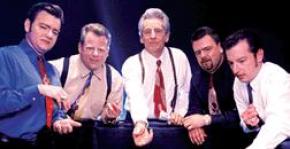Features
The Del McCoury Band

And now, at the turn of the century, after 40 years onstage, Del McCoury’s hot.
His presence on POLLSTAR’s cover was the focus of a feature story in Nashville’s The Tennessean last week, which reported the resurgence of bluegrass. The noise is that, with the July 10th release of Del and The Boys, the band will break wide open. His label, Skaggs Family Records / Ceili Music, announced June 8th a joint venture with Lyric Street for future projects.
Certainly, a traditional “grasshole” would disagree that McCoury is something new, but there is no doubt he is a recent addition to the vocabulary of many concert-goers. The credit for this goes to Bobby Cudd, Ronnie and Rob McCoury, Steve Earle, Trey Anastasio, Ricky Skaggs and manager Stan Strickland.
Most give the nod to Cudd, who has booked the band into rock clubs and other venues not normally attuned to bluegrass. McCoury’s son, Ronnie is also credited. Del’s new role of a hip granddad, though, comes from a choice encounter with some illustrious fans.
“Phish made up their minds [to take us on tour] before we ever thought of playing with them,” Strickland told POLLSTAR. “We didn’t realize what big fans they were until about three years ago at Farm Aid. The guys were standing outside Del’s bus, waiting for him to get off so they could get an autograph. That sent a message to everybody.”
Phish recorded the McCoury song “Beauty of My Dreams” and sent him a CD. Del had never heard of the band, but Ronnie knew them well. Soon, the Del McCoury Band was playing at Phish’s festival in Oswego, N.Y.
Ronnie (an eight-time IBMA winner for mandolin player) and brother Robbie are knowledgeable of pop artists and trends what Strickland calls the “other world.” That connection is a key to McCoury’s crossover success.
Through the two brothers, The Mountain a collaboration with Steve Earle introduced Del McCoury to a crowd of young, hip listeners. It helped blur the lines between bluegrass and the other world, as did invitations from Leftover Salmon, String Cheese Incident and, of course, Phish’s solo-touring Anastasio.
The band did its part, too, to track down the younger set.
“While we were taking big money in some festival and city events, we’d turn around and take next to nothing in the right college club,” Strickland said. “Now, we see that’s paid off in spades. There’s an underground awareness of Del McCoury out there, and we really don’t know where it’s going yet.”
As for the man himself, how did McCoury think this new awareness happened? “Well, you know, it kind of puzzles me,” he told POLLSTAR, shrugging off his involvement with a modest laugh.
Strickland compared McCoury to Chicago mobster Dion O’Bannion, the Irish bootlegger who ran a flower shop and became the band’s mascot for its 1999 album, The Family. “Like O’Bannion, Del can whoop your ass but he’d prefer to just speak quietly and get along with everybody.”

Jason Carter
Del McCoury
Ronnie McCoury
Mike Bub
“It’s refreshing [to play to a new audience],” McCoury said. “You get a lot of young people and they’re into all different styles of music and they appreciate any good music. The other end of it is Florida, where everybody is retired and they’re strictly bluegrass fans but they’re just not enthusiastic at all. … I imagine if I was as old as some of those people, I couldn’t clap my hands, either.”
Maybe a zeal for new crowds is one reason he and his band are the IBMA’s perennial winners for entertainer.
“I’ve never figured that out myself,” McCoury said, laughing, but believes it may have something to do with his aversion to performance programs. “I like to do songs the audience requests because I know they paid to get in,” he said, “and if they get a song played for them, why, that’s a little bit of a reward.”
McCoury credits Skaggs for steering him toward Ceili Music. “I was satisfied with Rounder, but they’ve got 10,000 people on their record label and I got to thinking, ‘Hey, you know what? Maybe I’ll get more attention on this label,’ which I found out really fast I did. It was more focused on what we were doing. Plus, I had a manager to think for me and the publicist to do things with which I never had before, so I knew it was a good move.”
Another change for the band was a small but dramatic one. McCoury complained that the last time he enjoyed performing was back before there were “all these tin boxes onstage” and the band would gather ’round a single mic. He didn’t think those old mics still existed.
Although expensive, unidirectional mics are more than available. Soon, McCoury was choreographing the band just like the old days, back when Monroe would throw a piece of paper down and tell his Blue Grass Boys to step up to it for a solo.
When Earle played with the band, he thought the choreography would be easy. “It took [Earle] a long time before he quit running into people,” Strickland said. “Del kept saying, ‘Boy, keep moving to the left!'”
The Del McCoury Band is currently scheduled for gigs through October.